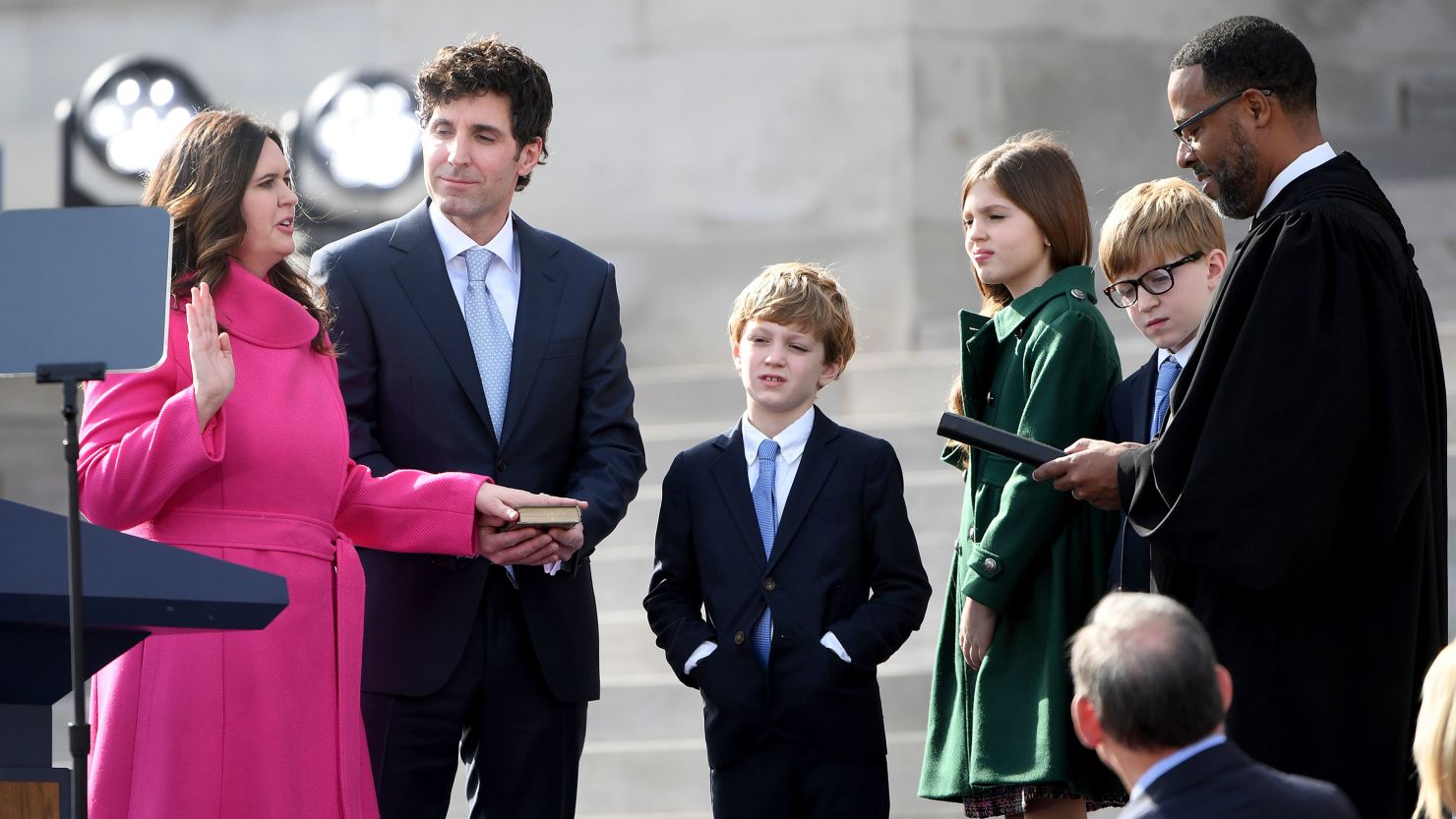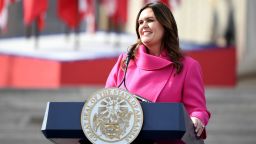Arkansas Gov. Sarah Huckabee Sanders signed an executive order this week barring the use of the term “Latinx” in official state documents, saying the government should use “ethnically appropriate language.”
Sanders, a Republican who gained national recognition as White House press secretary in the Trump administration, signed several orders involving government regulations Tuesday during her first day as governor.
“The government has a responsibility to respect its citizens and use ethnically appropriate language, particularly when referring to ethnic minorities,” the executive order read.
The term “Latinx” emerged as a gender-neutral signifier among Hispanic or Latino people in recent years, but it has become a divisive issue among many.
“Latinx” was originally intended to be an alternative to “Latino” or “Latina,” for people who don’t identify as male or female or who don’t want to be identified by their gender. Numerous activists, academics, politicians and corporations have adopted the term “Latinx” to be more inclusive.
Alexa Henning, a spokesperson for the governor, said the decision to reject the use of the term was made after hearing feedback from Hispanic leaders in the state, state lawmakers and senior members of her staff.
“During the transition we found instances of this term being used. Specifically, the Arkansas Department of Health has a Latinx Public Info Coordinator and Latinx Outreach Coordinator. As the governor said when signing this executive order, she will not permit this government to use culturally insensitive words,” Henning said in a statement.
In her order, Sanders said her administration’s policy is to “prohibit the use of culturally insensitive words for official state government business” and directed all state agencies to review their official documents and submit a report to the governor detailing their use of the terms “Latinx,” “latinx,” “Latinxs,” or “latinxs.”
All state offices, departments and agencies should replace those terms in their documents with variations of Hispanic or Latino within 60 days, the order states.
The term has been criticized for being difficult to pronounce in Spanish, its lack of popularity and being another way that the United States is exerting its influence on Latin America.
“As an immigrant, the use of the word ‘Latinx’ is not grammatically correct according to RAE (Real Academia Espa?ola), therefore I don’t use it on my day-to-day business,” Laura Estefenn, a public relations specialist in Atlanta who is Colombian, told CNN.
Sanders’ order also noted the Real Academia issue, as well as a 2020 Pew Research Center survey where researchers found that only one in four Hispanic or Latino adults had even heard of the term “Latinx,” and just 3% of them used it to describe themselves.
Other politicians have also made comments against the use of the term.
In November, Republican Rep. Monica De La Cruz of Texas mocked the use of the term during her victory speech.
She called her win “a victory for every single Hispanic who loves the Spanish language and does not want to be called Latinx.”
Rep. Ruben Gallego of Arizona, a Democrat, tweeted in 2021 that his office is not allowed to use “Latinx” in official communications.
“When Latino politicos use the term it is largely to appease White rich progressives who think that is the term we use. It is a vicious circle of confirmation bias,” he tweeted.
Sanders previously worked in the George W. Bush administration for two years. She later ran her father’s 2008 campaign for the Republican presidential nomination and was his campaign manager for his 2016 bid.
She became White House press secretary in 2017. The Republican left the position in 2019 as a controversial figure on the national stage, serving as one of former President Donald Trump’s most trusted and unwavering defenders.
‘Politically, we do not need to use the term to represent all of us’
Tanya Rodriguez-Hodges, a member of the Hispanic/Latino affairs advisory committee of the South Carolina Commission for Minority Affairs, said she would support Gov. Henry McMaster, a Republican, if he decides to issue a similar executive order.
“I feel that, politically, we do not need to use the term ‘Latinx’ to represent all of us as a grouping of people,” said Rodriguez-Hodges, a Puerto Rican who is the executive director of the advocacy group Latino Communications Community Development Corporation.
She told CNN she doesn’t believe the term should be used exclusively to describe the community especially if it excludes other terms like Latino but said it “came from a good place.”
“I admire our youth for taking something that they felt was not gender neutral and changing it as an identifier to represent who they are, where they are right now,” said Rodriguez-Hodges.
While Latino or Hispanic are the more common terms use to describe the community based on its ethnic background, others, like Chicano, are also used. The latter is often used by Americans whose families have lived north of the Rio Grande since before the territories became part of the United States. It is associated with 1960s Mexican American Civil Rights movement, also known as the Chicano Movement.
During the opening of the Cheech Marin Center for Chicano Art and Culture in Riverside, California, last year, comedian Cheech Marin said: “That word (Latinx) is for my grandchildren.”
An effort ‘to divide and distract from the issues’
The governor’s order has come under criticism by some activists.
Jose Gutierrez, a local activist who said he’s worked for a few organizations in Arkansas and is now a consultant, accused Sanders of playing politics with the executive order.
“Granted, the larger Spanish speaking community will not be phased or concerned by this. Especially those who have pushed back on the term ‘Latinx.’ However, we should make a conscious distinction that ‘Latinx’ is about affirming our people in their identities. Not exclusion of those who don’t align with the term,” he said.
Vanessa Cardenas, executive director of the progressive national organization America’s Voice, called the order an effort “by Republicans to divide and distract from the issues that are top of mind for American voters, including the Latino community.”
“The Latino community in Arkansas, and across the country, care about improving their economy, access to healthcare, and better education for their children and that is what Governor Huckabee should be focused on,” Cardenas said.
CNN contacted a number of activists who expressed concern with the governor’s action but did not want to comment for this story, fearing an adverse reaction towards their organizations.



